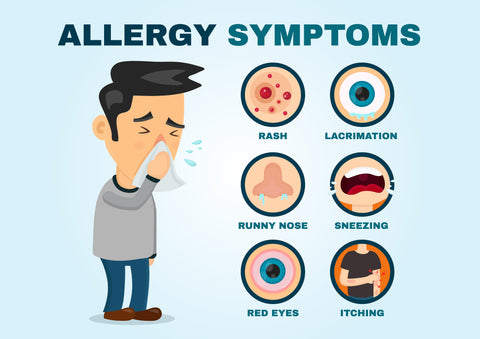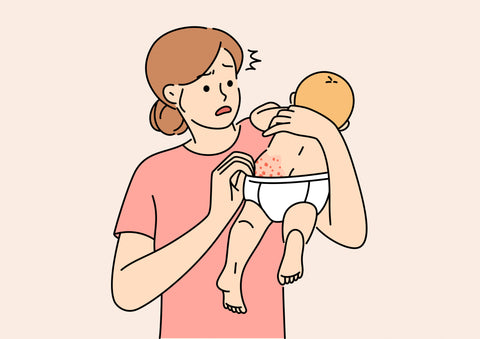Do allergies cause gland swelling? The high-incidence allergy season has arrived, and you may be experiencing unbearable itching all over your body, along with constant sneezing and rubbing of your itchy nose, nasal inflammation, asthma attacks, sore throat, and many other uncomfortable symptoms. These symptoms are signs of allergies, or they may be due to other problems caused by allergies (such as gland swelling).
Although you may not associate allergies with gland swelling, any allergy (seasonal allergies, dust mite allergies, pet hair allergies, etc.) can sometimes lead to gland swelling. But rest assured, gland swelling caused by allergies is a very common health issue.
In this blog post, we will discuss the causes, and symptoms of allergies, and possible treatments that may help alleviate allergies and gland swelling. Please continue reading to learn more.
First, we need to understand what glands are and what their main functions are in our bodies.
1. What is a gland, why does it swell, and what does swelling signify?

What are glands, what glands does the human body have, and what are their main functions?
Glands are organs or tissues in the body that produce and secrete substances for specific purposes. The human body has many glands, distributed throughout the body (such as endocrine glands, exocrine glands, mixed glands, and lymphoid organs). Their main functions include regulating metabolism, growth, development, reproduction, stress response, digestion, immune response, etc. They play important roles in maintaining internal balance, regulating bodily functions, resisting pathogens, and supporting growth and development in our bodies.
|
Type |
Name |
Function |
|
Endocrine Gland |
Thyroid gland, adrenal glands, pancreas, and gonads (testes and ovaries) |
These glands secrete hormones directly into the bloodstream, regulating bodily functions and maintaining internal balance. |
|
Exocrine Gland |
Sweat glands, salivary glands, sebaceous glands, and mammary glands |
These glands secrete substances through ducts to the outside of the body or into body cavities, facilitating lubrication, temperature regulation, digestion, and defense against pathogens. |
|
Lymphoid Organs |
Lymph nodes, thymus, spleen, and tonsils |
These organs produce and store white blood cells and antibodies, aiding the body in resisting infection and disease, crucial for immune function. |
|
Mixed Gland |
Pancreas |
This gland exhibits both endocrine and exocrine functions. |
Why do glands swell
Glandular enlargement can be caused by various reasons, depending on the specific type of gland and the underlying cause. Some common reasons include:
- Allergic reactions: Allergic reactions to certain allergens can lead to glandular enlargement, such as nasal gland enlargement caused by allergic rhinitis.
- Infection: Infections by bacteria, viruses, or other pathogens can cause inflammation and swelling of glands. A typical example is lymph node enlargement caused by lymph node infection.
- Inflammation: Inflammatory responses of glands may be a natural reaction of the body to injury, irritation, or infection. In such cases, glands increase blood flow and cellular infiltration, resulting in enlargement.
- Tumors: Glandular tumors may be benign or malignant and can cause glandular enlargement. Abnormal proliferation of tumor cells may occupy the space of normal tissues, leading to an increase in glandular volume.
- Metabolic issues: Some metabolic issues, such as hyperthyroidism or hypothyroidism, may cause enlargement of corresponding glands (such as the thyroid gland).
- Autoimmune diseases: Autoimmune diseases may lead to the immune system attacking body tissues, resulting in glandular inflammation and enlargement, such as autoimmune thyroid diseases.
2. What Is an allergy? can allergies make your glands swell

What is an allergy?
An allergy is a condition of abnormal immune system response in the body, occurring when exposed to substances that are typically harmless to most people. These substances, known as allergens, can include pollen in the air, dust mites, and pet dander, as well as food, medications, insect bites, or certain chemicals.
During an allergic reaction, the immune system mistakenly identifies these allergens as harmful to the body and releases chemicals such as histamine to combat them. These chemicals lead to allergic symptoms, such as:
- Skin reactions: Such as rash, itching, hives, etc.
- Respiratory reactions: Such as sneezing, runny nose, nasal congestion, itchy throat, coughing, asthma, etc.
- Digestive system reactions: Such as abdominal pain, nausea, vomiting, diarrhea, etc.
- Systemic reactions: Such as anaphylaxis, which is a severe allergic reaction that can be life-threatening.
Although allergies are a very common health problem, there is currently no method that can completely cure them, so it is very important to avoid exposure to allergens as much as possible.
Can allergies cause gland enlargement?
Allergies can cause gland enlargement, but not all gland enlargements are caused by allergies. For example, allergic rhinitis is a common allergic disease. When the nasal cavity is stimulated by allergens, the mucous membrane inside the nasal cavity undergoes an inflammatory reaction, leading to dilation of blood vessels and tissue swelling in the nasal cavity, resulting in nasal gland enlargement. Similarly, allergic asthma may also cause swelling of the airway mucosa and enlargement of the glands around the airway.
In children, prolonged allergies can lead to secondary infections such as allergic cough, allergic rhinitis, allergic asthma, and sinusitis. Among them, allergic rhinitis can lead to secondary infections of our glands (such as nasal adenoids, and tonsils). Enlargement of the glands can block nasal breathing, reduce oxygen intake from the air, lead to mouth breathing during sleep, resulting in a significant decrease in sleep quality, low oxygen concentration in the blood, and thus affecting the body's growth and development. This is why children with allergic reactions often have a smaller height or weight than their peers.
Therefore, people with allergies may be more prone to secondary infections, such as sinus infections, especially when their sinuses are easily blocked due to seasonal allergies. If you experience allergic symptoms and swollen lymph nodes, it is likely due to some form of secondary infection.
5 common allergic symptoms and how they affect your glands
|
Allergic Symptom |
Cause |
How It Affects Glands |
|
Nasal congestion, Sneezing, Itchy nose |
Allergic rhinitis usually causes inflammation and swelling of the nasal mucosa, leading to nasal congestion and frequent sneezing. |
May lead to nasal gland enlargement due to inflammation and swelling of the nasal mucosa caused by allergic rhinitis. |
|
Itchy skin, Rash |
Skin allergic reactions may cause itching, redness, and rash, or hives. |
May affect skin glands, such as sweat glands and sebaceous glands, leading to increased secretion or activation. |
|
Difficulty breathing and Asthma |
Severe allergic reactions may cause airway inflammation and spasms, resulting in difficulty breathing and asthma attacks. |
May affect respiratory glands, such as tracheal glands and bronchial glands, leading to enlargement or increased secretion. |
|
Indigestion and Diarrhea |
Food allergies or intolerances may cause inflammatory reactions in the digestive system, leading to diarrhea, abdominal pain, and indigestion. |
May affect digestive glands, such as gastric glands, intestinal glands, and pancreatic glands, leading to abnormal secretion or enlargement. |
|
Eye symptoms |
Allergic conjunctivitis commonly causes redness, itching, and increased tear production (itchy eyes, watery eyes). |
May affect eye glands, such as the lacrimal gland, leading to increased secretion or inflammation. |
In summary, allergic reactions may affect various glands, including nasal glands, skin glands, respiratory glands, digestive glands, and eye glands. These effects may include gland enlargement, abnormal secretion, or inflammatory responses.
By now, you should have a general understanding of the relationship between gland enlargement and allergies. Next, we need to know how to relieve glandular enlargement most effectively.
3. Curing gland enlargement caused by allergies: what's the fastest method?
As mentioned earlier, there is currently no complete cure for allergies. The only effective prevention of allergies is to boost your immune system and avoid contact with allergens as much as possible. Self-care and medication can also help alleviate symptoms. However, it's important to note that the following therapies may not be suitable for everyone, so it's best to consult a healthcare professional before starting any new treatment.
- Avoiding Allergens: The most effective method is to avoid contact with substances that cause allergies as much as possible. This may include allergens such as food, medications, pollen, animal dander, etc. Investing in the best HEPA air purifier for asthma and allergies can filter out pollutants, allergens, and odors, effectively reducing allergen exposure.
- Local Treatments: For localized gland enlargement, such as nasal gland enlargement, local treatments may help alleviate symptoms. This may include local sprays or medications, such as nasal sprays, to relieve nasal congestion and inflammation. Irrigating the nasal cavity with saline solution may also help wash out allergens from the sinuses and reduce congestion.
- Lifestyle Adjustments: A healthy balanced diet supports a healthy immune system. Practices such as balanced nutrition, adequate sleep, and stress reduction help strengthen the immune system and alleviate allergic reactions.
- Medications: Medications such as antihistamines (e.g., loratadine, cetirizine), corticosteroids (e.g., corticosteroid sprays), and anti-inflammatories can alleviate allergic reactions and related symptoms. These medications help alleviate gland enlargement by reducing inflammation and preventing allergic reactions.
- Immunotherapy: For some patients with severe allergies, allergen immunotherapy (allergy shots) may be an effective option. This treatment gradually exposes patients to allergens to help their immune system produce fewer reactions to them.
4. If my child has gland enlargement, what should i do?

According to the Centers for Disease Control and Prevention (CDC) report, about 26% of adults and 19% of children in the United States are affected by seasonal allergies. In addition to seasonal allergies, there are also food and skin allergies, all of which cause different symptoms. While this can be reassuring, allergies and gland enlargement can be quite uncomfortable if left untreated.
When your child shows signs of allergies or gland enlargement, the best next step is to see an allergy specialist. However, your main job next is to minimize allergies and reduce exposure to allergens as much as possible.
The home HEPA air filter and humidifier are very important for families with allergies(Related blog:Does Humidifier Help Allergies), This is very effective in helping you reduce allergen exposure and lower allergen concentrations.





